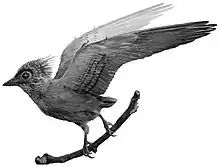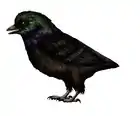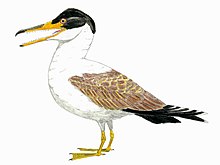| Unenlagiids Temporal range: Late Cretaceous, Possible Early Cretaceous record | |
|---|---|
 | |
| Life reconstruction of Austroraptor cabazai | |
| Scientific classification | |
| Domain: | Eukaryota |
| Kingdom: | Animalia |
| Phylum: | Chordata |
| Clade: | Dinosauria |
| Clade: | Saurischia |
| Clade: | Theropoda |
| Clade: | Eumaniraptora |
| Family: | †Unenlagiidae Bonaparte, 1999 |
| Type species | |
| †Unenlagia comahuensis Novas & Puerta, 1997 | |
| Subfamilies | |
| Synonyms | |
| |
Unenlagiidae is a proposed family of eumaniraptoran paravians that includes the subfamilies Unenlagiinae and possibly Halszkaraptorinae. Fossils of both subfamilies have been found in both Gondwanan and Laurasian deposits. The biology of the group suggests that some members were semiaquatic specialists.[1]
Classification
The family Unenlagiidae traditionally includes the same members as the previously named subfamily of Dromaeosauridae, Unenlagiinae, so Unenlagiidae was often seen as a synonym of Dromaeosauridae. However, since the 2010s, there have been subsequent studies that have questioned this placement, necessitating the revival of the family name. Some have placed unenlagiids as outside Dromaeosauridae, being the sister taxon or closely related to Avialae,[2][3] while others have placed the newly recognized halszkaraptorines in the family, as basal deinonychosaurs outside Dromaeosauridae and Troodontidae.[4] Other recent studies supported the traditional placement of Halszkaraptorinae and Unenlagiinae in Dromaeosauridae, forming no distinct clade.[1][5] In 2021, Brum et al. named the clade Unenlagiinia for a unified Unenlagia+Halszkaraptor clade, recovering them as basal dromaeosaurs.[6]
The following cladogram is from Motta et al., 2020, showing Unenlagiidae outside dromaeosaurids and more closely related to Avialae:[3]
| Paraves |
| |||||||||||||||||||||||||||||||||||||||||||||||||||||||||||||||||||||||||||||||||
References
- 1 2 Cau, A.; Beyrand, V.; Voeten, D.; Fernandez, V.; Tafforeau, P.; Stein, K.; Barsbold, R.; Tsogtbaatar, K.; Currie, P.; Godrfroit, P. (6 December 2017). "Synchrotron scanning reveals amphibious ecomorphology in a new clade of bird-like dinosaurs". Nature. 552 (7685): 395–399. Bibcode:2017Natur.552..395C. doi:10.1038/nature24679. PMID 29211712. S2CID 4471941.
- ↑ Federico L. Agnolín and Fernando E. Novas (2013). Avian ancestors. A review of the phylogenetic relationships of the theropods Unenlagiidae, Microraptoria, Anchiornis and Scansoriopterygidae. SpringerBriefs in Earth System Sciences. pp. 1–96. doi:10.1007/978-94-007-5637-3. ISBN 978-94-007-5636-6. S2CID 199493087.
- 1 2 Matías J. Motta; Federico L. Agnolín; Federico Brissón Egli; Fernando E. Novas (2020). "New theropod dinosaur from the Upper Cretaceous of Patagonia sheds light on the paravian radiation in Gondwana". The Science of Nature. 107 (3): Article number 24. Bibcode:2020SciNa.107...24M. doi:10.1007/s00114-020-01682-1. hdl:11336/135530. PMID 32468191. S2CID 218913199.
- ↑ Hartman, Scott; Mortimer, Mickey; Wahl, William R.; Lomax, Dean R.; Lippincott, Jessica; Lovelace, David M. (2019). "A new paravian dinosaur from the Late Jurassic of North America supports a late acquisition of avian flight". PeerJ. 7: e7247. doi:10.7717/peerj.7247. PMC 6626525. PMID 31333906.
- ↑ Cau, Andrea (2020-02-25). "The body plan of Halszkaraptor escuilliei (Dinosauria, Theropoda) is not a transitional form along the evolution of dromaeosaurid hypercarnivory". PeerJ. 8: e8672. doi:10.7717/peerj.8672. ISSN 2167-8359. PMC 7047864. PMID 32140312.
- ↑ Brum, Arthur S.; Pêgas, Rodrigo V.; Bandeira, Kamila L.N.; Souza, Lucy G.; Campos, Diogenes A.; Kellner, Alexander W.A. (2021). "A new Unenlagiinae (Theropoda: Dromaeosauridae) from the Late Cretaceous of Brazil". Papers in Palaeontology. 7 (4): 2075–2099. doi:10.1002/spp2.1375. S2CID 238854675.

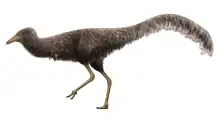

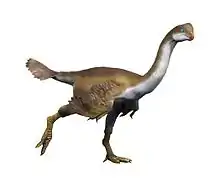
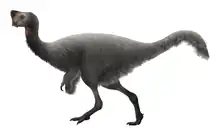
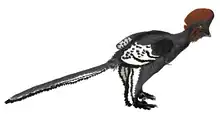


.png.webp)


.jpg.webp)
